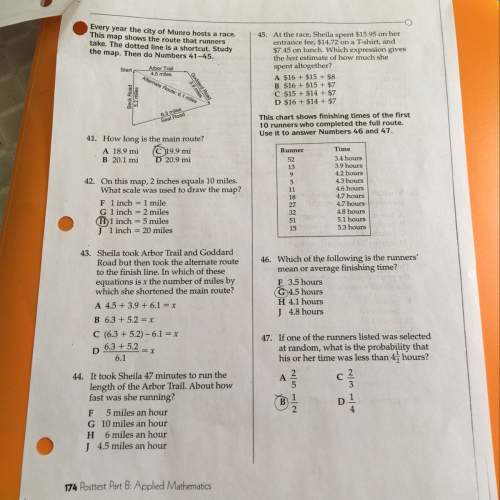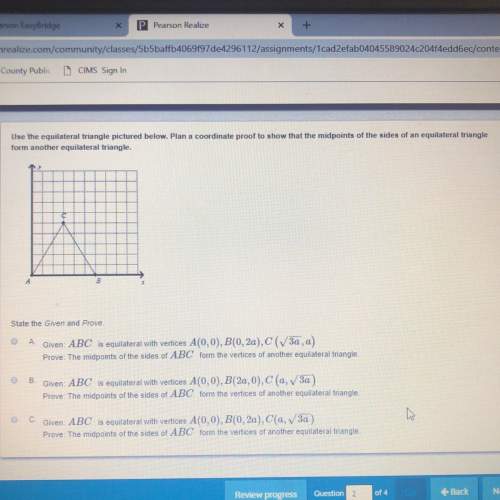
Mathematics, 16.10.2020 06:01 santana647
The seventh term of an arithmetic progression is equal to twice the fifth term. The sum of the first seven terms is 84. Find the first term.

Answers: 2


Another question on Mathematics

Mathematics, 21.06.2019 18:30
The volume of gas a balloon can hold varies directly as the cube of its radius. imagine a balloon with a radius of 3 inches can hold 81 cubic inches of gas. how many cubic inches of gas must be released to reduce the radius down to 2 inches?
Answers: 1


Mathematics, 21.06.2019 21:30
Using the information in the customer order, determine the length and width of the garden. enter the dimensions. length: feet width: feet
Answers: 3

Mathematics, 21.06.2019 23:00
1. an economy consists of three workers: larry, moe, and curly. each works 10 hours a day and can produce two services: mowing lawns and washing cars. in an hour, larry can either mow one lawn or wash one car; moe can either mow one lawn or wash two cars; and curly can either mow two lawns or wash one car. a. calculate how much of each service is produced under the following circumstances: a. all three spend all their time mowing lawns. b. all three spend all their time washing cars. c. all three spend half their time on each activity d. larry spends half of his time on each activity, while moe only washes cars and curly only mows lawns b. using your answers to part a, draw a production possibilities frontier and label points a, b, c, and d on your graph. explain why the production possibilities frontier has the shape it does. c. are any of the allocations calculated in part a inefficient? explain.
Answers: 3
You know the right answer?
The seventh term of an arithmetic progression is equal to twice the fifth term. The sum
of the firs...
Questions

SAT, 10.10.2020 14:01

Geography, 10.10.2020 14:01



Mathematics, 10.10.2020 14:01



Mathematics, 10.10.2020 14:01


History, 10.10.2020 14:01



Mathematics, 10.10.2020 14:01




Spanish, 10.10.2020 14:01

History, 10.10.2020 14:01

Mathematics, 10.10.2020 14:01

 = a₁ + (n - 1)d
= a₁ + (n - 1)d =
=  [ 2a₁ + (n - 1)d ]
[ 2a₁ + (n - 1)d ] = 84 , then
= 84 , then (2a₁ + 6d) = 84
(2a₁ + 6d) = 84 




